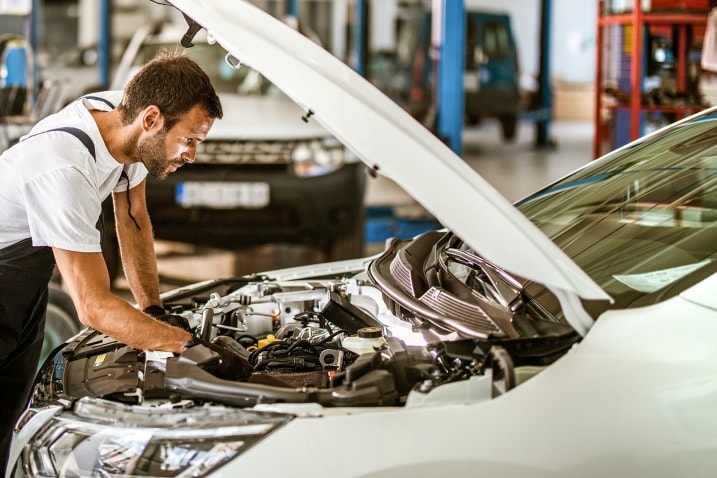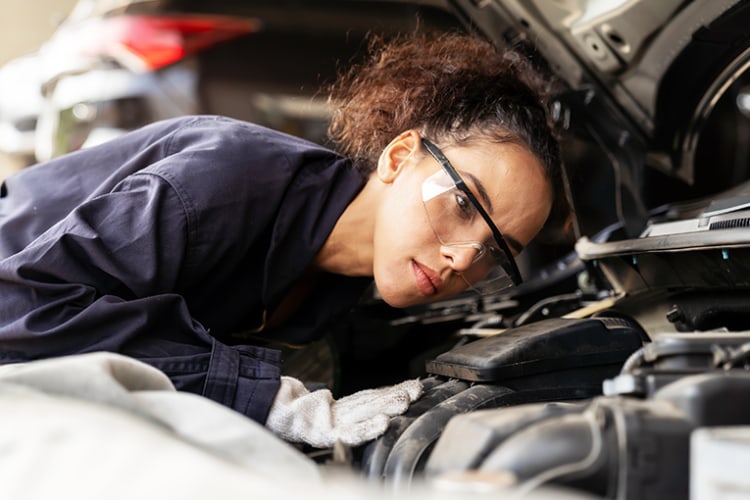All Categories
Featured
When it pertains to maintaining an automobile, recognizing the differences in between regular repair and maintenance is essential for auto owners. Both aspects are necessary for the longevity and reliability of your vehicle, but they serve distinctive objectives and are taken care of in a different way. By recognizing when to do normal upkeep versus when to address repair work, you can maintain your automobile running smoothly and stay clear of expensive shocks.
![]()
Regular Upkeep: Avoidance is Trick. Routine upkeep entails the regular, preventive care that your vehicle calls for to stay clear of future issues. It is typically scheduled at certain intervals, such as every 3,000 or 5,000 miles, based on your automobile's guidebook or producer referrals. Regular upkeep assists make sure that your auto stays in optimum problem, avoiding wear and tear from creating significant issues down the line.
Some common instances of routine upkeep include:
Oil Adjustments: Normal oil changes are vital to keep your engine lubricated and running successfully. Oil helps in reducing friction in between engine parts, protecting against getting too hot and unnecessary wear. Tire Maintenance: This includes tire turnings, balancing, and examining tire pressure. Proper tire maintenance ensures far better fuel efficiency, dealing with, and tire long life. Brake Inspections: Regular look at your brakes, consisting of pads and liquid levels, can capture any type of possible problems early, protecting against brake failing and making sure security. Liquid Checks and Top-Ups: Ensuring your cars and truck has the ideal levels of coolant, transmission liquid, power guiding liquid, and brake fluid is essential for general automobile wellness. Air Filter Replacement: Replacing the air filter makes sure that your engine gets tidy air, which assists it run much more effectively and decreases engine pressure. Routine maintenance is normally arranged and doesn't entail repairing any busted components-- it has to do with keeping whatever in good functioning order and preventing future breakdowns.
Fixes: Dealing With the Unexpected. Repair services, in contrast, are essential when something fails with your automobile. Fixings address problems that influence the car's performance or safety and require to be fixed immediately. Unlike upkeep, which is preventative, repair work normally happen when parts have actually worn, stopped working, or malfunctioned.
Examples of common repair services consist of:
Transmission Issues: If your cars and truck is having difficulty moving gears or experiences slipping, the transmission might need repair services or substitute. Engine Failure: If your engine begins misfiring, overheating, or delaying, it might need considerable repairs or replacement of parts like the timing belt, pistons, or seals. Brake Repairs: While brake pads are component of routine maintenance, if your brakes are making a grinding sound or are no much longer operating appropriately, brake repairs will certainly be needed, such as replacing the calipers or the rotors. Battery Replacement: If your automobile won't start or the battery is no much longer holding a charge, you'll need a substitute battery, which is a repair service. Suspension and Steering Repairs: Issues with the suspension or guiding system-- such as trouble steering or a rough experience-- can be indications that components like struts or shock absorbers need repair service. Repairs are commonly a lot more urgent and expensive than regular maintenance. They are required when something breaks or breakdowns, which can influence the lorry's performance and security.
Key Distinctions In Between Routine Repair And Maintenance. Timing: Regular upkeep is preventative and performed at scheduled intervals, while fixings are reactive and occur when something goes incorrect. Price: Upkeep is usually much less costly, as it includes monitoring and changing smaller sized parts or liquids. Fixings, especially major ones, have a tendency to be a lot more pricey as a result of the complexity of taking care of busted or defective parts. Function: The objective of upkeep is to keep your car running well and protect against issues. Repair work, on the various other hand, are essential to repair issues that have actually currently taken place. Regularity: Routine upkeep occurs constantly at set intervals (e.g., every 5,000 miles), while fixings are much less foreseeable, commonly happening when components put on or stop working out all of a sudden. Why Both are very important. Both regular repair and maintenance are essential for the long-lasting health of your car. Regular maintenance helps maintain your vehicle running smoothly and can avoid many typical problems from developing to begin with. By remaining on top of arranged solutions, you can deal with little problems before they turn right into expensive repair services.
![]()
However, repair services are sometimes unpreventable. Despite having the most effective upkeep, components wear in time, and unanticipated issues can develop. When repair services are required, resolving them quickly can prevent more damage and ensure your lorry's safety and reliability.
Final thought. In recap, understanding the difference in between routine upkeep and repair services assists you take the appropriate actions to care for your vehicle. Regular upkeep can save you money by protecting against larger concerns, while fixings are necessary when something fails. By remaining positive with upkeep and resolving fixings when required, you can expand the life expectancy of your vehicle and guarantee that it remains to perform at its finest for several years to come.

Regular Upkeep: Avoidance is Trick. Routine upkeep entails the regular, preventive care that your vehicle calls for to stay clear of future issues. It is typically scheduled at certain intervals, such as every 3,000 or 5,000 miles, based on your automobile's guidebook or producer referrals. Regular upkeep assists make sure that your auto stays in optimum problem, avoiding wear and tear from creating significant issues down the line.
Some common instances of routine upkeep include:
Oil Adjustments: Normal oil changes are vital to keep your engine lubricated and running successfully. Oil helps in reducing friction in between engine parts, protecting against getting too hot and unnecessary wear. Tire Maintenance: This includes tire turnings, balancing, and examining tire pressure. Proper tire maintenance ensures far better fuel efficiency, dealing with, and tire long life. Brake Inspections: Regular look at your brakes, consisting of pads and liquid levels, can capture any type of possible problems early, protecting against brake failing and making sure security. Liquid Checks and Top-Ups: Ensuring your cars and truck has the ideal levels of coolant, transmission liquid, power guiding liquid, and brake fluid is essential for general automobile wellness. Air Filter Replacement: Replacing the air filter makes sure that your engine gets tidy air, which assists it run much more effectively and decreases engine pressure. Routine maintenance is normally arranged and doesn't entail repairing any busted components-- it has to do with keeping whatever in good functioning order and preventing future breakdowns.
Fixes: Dealing With the Unexpected. Repair services, in contrast, are essential when something fails with your automobile. Fixings address problems that influence the car's performance or safety and require to be fixed immediately. Unlike upkeep, which is preventative, repair work normally happen when parts have actually worn, stopped working, or malfunctioned.
Examples of common repair services consist of:
Transmission Issues: If your cars and truck is having difficulty moving gears or experiences slipping, the transmission might need repair services or substitute. Engine Failure: If your engine begins misfiring, overheating, or delaying, it might need considerable repairs or replacement of parts like the timing belt, pistons, or seals. Brake Repairs: While brake pads are component of routine maintenance, if your brakes are making a grinding sound or are no much longer operating appropriately, brake repairs will certainly be needed, such as replacing the calipers or the rotors. Battery Replacement: If your automobile won't start or the battery is no much longer holding a charge, you'll need a substitute battery, which is a repair service. Suspension and Steering Repairs: Issues with the suspension or guiding system-- such as trouble steering or a rough experience-- can be indications that components like struts or shock absorbers need repair service. Repairs are commonly a lot more urgent and expensive than regular maintenance. They are required when something breaks or breakdowns, which can influence the lorry's performance and security.
Key Distinctions In Between Routine Repair And Maintenance. Timing: Regular upkeep is preventative and performed at scheduled intervals, while fixings are reactive and occur when something goes incorrect. Price: Upkeep is usually much less costly, as it includes monitoring and changing smaller sized parts or liquids. Fixings, especially major ones, have a tendency to be a lot more pricey as a result of the complexity of taking care of busted or defective parts. Function: The objective of upkeep is to keep your car running well and protect against issues. Repair work, on the various other hand, are essential to repair issues that have actually currently taken place. Regularity: Routine upkeep occurs constantly at set intervals (e.g., every 5,000 miles), while fixings are much less foreseeable, commonly happening when components put on or stop working out all of a sudden. Why Both are very important. Both regular repair and maintenance are essential for the long-lasting health of your car. Regular maintenance helps maintain your vehicle running smoothly and can avoid many typical problems from developing to begin with. By remaining on top of arranged solutions, you can deal with little problems before they turn right into expensive repair services.

However, repair services are sometimes unpreventable. Despite having the most effective upkeep, components wear in time, and unanticipated issues can develop. When repair services are required, resolving them quickly can prevent more damage and ensure your lorry's safety and reliability.
Final thought. In recap, understanding the difference in between routine upkeep and repair services assists you take the appropriate actions to care for your vehicle. Regular upkeep can save you money by protecting against larger concerns, while fixings are necessary when something fails. By remaining positive with upkeep and resolving fixings when required, you can expand the life expectancy of your vehicle and guarantee that it remains to perform at its finest for several years to come.
Latest Posts
Explore Leading Car Repair Solutions from Montclare Auto Repair – Quality Service Today
Published en
1 min read
Reasons Regular Vehicle Maintenance at Montclare Auto Repair Reduces Costs
Published en
1 min read
Unlock WyHy Federal Credit Union – Smart Money Management for Your Money Goals
Published en
1 min read
More
Latest Posts
Explore Leading Car Repair Solutions from Montclare Auto Repair – Quality Service Today
Published May 29, 25
1 min read
Reasons Regular Vehicle Maintenance at Montclare Auto Repair Reduces Costs
Published May 27, 25
1 min read
Unlock WyHy Federal Credit Union – Smart Money Management for Your Money Goals
Published May 25, 25
1 min read